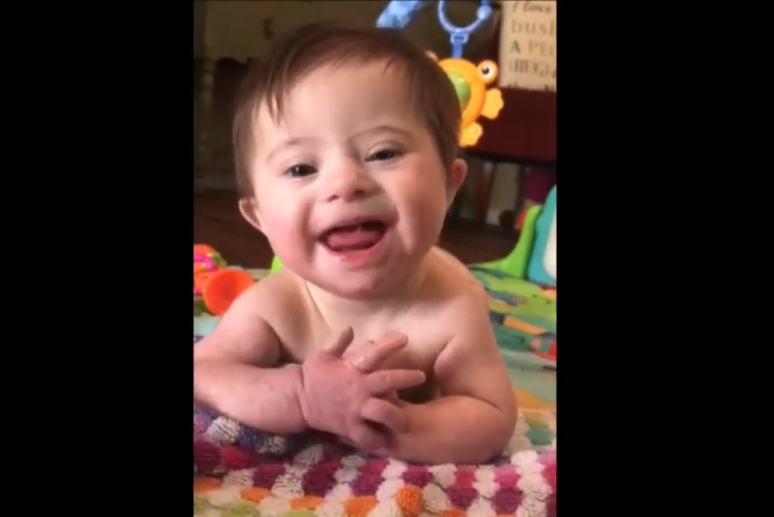A decision this morning by a three-judge panel of the 8th Circuit Court of Appeals was both very disappointing—it upheld a decision overturning an Arkansas law banning abortions after 18 weeks and for abortions and when the unborn child is diagnosed with Down syndrome—and encouraging—the concurring opinions pointed a way forward in both instances, but especially when it comes to abortions performed when the reason is because the child has been prenatally diagnosed with Down syndrome.
The decision comes less than two months after a three-judge panel of the 6th U.S. Circuit Court of Appeals gave the state of Tennessee a big victory when it ruled the state could begin enforcing a ban on abortion when the abortionist knows that the woman is seeking the abortion because of the child’s sex or race or if he knows the woman is seeking an abortion because of a diagnosis of Down syndrome.
Today’s opinion was written by Judge James Loken. Although Judge Bobby Shepherd and Judge Ralph Erickson joined, it was their criticism of Supreme Court abortion jurisprudence in their concurrences that is most telling.
The core of the 3-0 opinion is the conclusion that contrary to the State’s argument, the age of viability has not shifted prior to 18 weeks–
As Defendants presented no generally accepted medical evidence that the attainment of viability has shifted to before eighteen weeks after gestation, we must affirm the district court’s order preliminarily enjoining enforcement of Act 493, which effectively prohibits a substantial universe of pre-viability abortions. …
–And therefore that (as Ed Whelan noted),
Click here to sign up for pro-life news alerts from LifeNews.com
The panel likewise concluded that under Casey the ban on Down syndrome abortions could not be applied to pre-viability abortions
However, Judge Shepherd honed in on the High Court’s viability standard as enunciated in Planned Parenthood v. Casey:
Because the Court’s opinion applies binding Supreme Court precedent, I join it in full. I write separately, however, to reiterate my view that “good reasons exist for the [Supreme] Court to reevaluate its jurisprudence” regarding the viability standard as announced in Planned Parenthood of Southeastern Pennsylvania v. Casey. …
Today’s opinion is another stark reminder that the viability standard fails to adequately consider the substantial interest of the state in protecting the lives of unborn children as well as the state’s “compelling interest in preventing abortion from becoming a tool of modern-day eugenics.” Box [v. Planned Parenthood (2019)] (Thomas, J., concurring). The viability standard does not and cannot contemplate abortions based on an unwanted immutable characteristic of the unborn child. And Casey directs that we resolve this inquiry by considering viability alone.
Judge Shepherd observes, as alluded to in the quote above, that in a prior case, the Supreme Court chose not to consider abortions because of a Down syndrome diagnosis, and then went on to quote more from Justice Thomas:
In a separate concurring opinion, Justice Thomas expressed his view that the latter law“ and other laws like it promote a State’s compelling interest in preventing abortion
from becoming a tool of modern-day eugenics,” and acknowledged that “with today’s prenatal screening tests and other technologies, abortion can easily be used to eliminate children with unwanted characteristics.”
Judge Erickson likewise asks the High Court to review its viability standard:
I concur in the Court’s opinion and in Judge Shepherd’s concurrence, but write separately to emphasize my belief that there are important reasons for the Supreme
Court to revisit its precedent in Planned Parenthood of Southeastern Pennsylvania v. Casey, 505 U.S. 833 (1992). Viability as a standard is overly simplistic and overlooks harms that go beyond the state’s interest in a nascent life alone.
The great glory of humanity is its diversity. We are, as a species, remarkably variant in our talents, abilities, appearances, strengths, and weaknesses. The human person has immense creative powers, a range of emotional responses that astound the observant, and a capacity to love and be loved that is at the core of human existence. Each human being possesses a spirit of life that at our finest we have all recognized is the essence of humanity. And each human being is priceless beyond measure. Children with Down syndrome share in each of these fundamental attributes of humanity.
Then, arguably the most important statement:
While the state’s interest in nascent life has been recognized to give way to the right of a woman to be free from “unduly burdensome interference with her freedom to decide whether to terminate her pregnancy” id. at 874 (quoting Maher v. Roe, 432 U.S. 464, 473–74(1977)), it is apparent that the right is not, and should not be, absolute. By focusing on viability alone, the Court fails to consider circumstances that strike at the core of humanity and pose such a significant threat that the State of Arkansas might rightfully place that threat above the right of a woman to choose to terminate a pregnancy.
LifeNews.com Note: Dave Andrusko is the editor of National Right to Life News and an author and editor of several books on abortion topics. This post originally appeared in at National Right to Life News Today —- an online column on pro-life issues.








